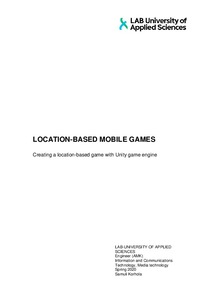Understanding Player Preferences to Enhance Development Strategies in Starbase, a Sci-Fi MMO Game
Wiik, Petri (2025)
Wiik, Petri
2025
All rights reserved. This publication is copyrighted. You may download, display and print it for Your own personal use. Commercial use is prohibited.
Julkaisun pysyvä osoite on
https://urn.fi/URN:NBN:fi:amk-202504156552
https://urn.fi/URN:NBN:fi:amk-202504156552
Tiivistelmä
The aim of this thesis was to generate recommendations that support improved player engagement and retention in Starbase, a sci-fi MMO developed by Frozenbyte Oy. The purpose of the study was to examine player behavior, motivations, and preferences to provide the developer with research-based insights for future development planning and community interaction. The work was commissioned by Frozenbyte and contributes directly to its efforts to revitalize the game following a two-year development hiatus.
The study was carried out using a quantitative case study approach. Data was collected through an online survey distributed to current, former, and potential players. The survey consisted of structured multiple-choice and Likert-scale items. Responses were analyzed using descriptive and inferential statistical methods, and interpreted through selected theoretical frameworks including Self-Determination Theory, Uses and Gratifications Theory, and Social Capital Theory.
The findings show that initial interest in Starbase is primarily driven by its creative building and engineering systems. Disengagement is commonly associated with limited progression, unclear onboarding, and slow update cycles. Technical performance issues and a lack of long-term objectives also contributed to player dissatisfaction. Social features were seen as underdeveloped, while consistent developer communication - particularly through Progress Notes - was viewed as valuable for maintaining engagement.
It is concluded that long-term retention would benefit from clearer progression structures, improved onboarding experiences, and strengthened communication practices. Although focused on Starbase, the results may offer insight into broader player engagement strategies in MMO development.
The study was carried out using a quantitative case study approach. Data was collected through an online survey distributed to current, former, and potential players. The survey consisted of structured multiple-choice and Likert-scale items. Responses were analyzed using descriptive and inferential statistical methods, and interpreted through selected theoretical frameworks including Self-Determination Theory, Uses and Gratifications Theory, and Social Capital Theory.
The findings show that initial interest in Starbase is primarily driven by its creative building and engineering systems. Disengagement is commonly associated with limited progression, unclear onboarding, and slow update cycles. Technical performance issues and a lack of long-term objectives also contributed to player dissatisfaction. Social features were seen as underdeveloped, while consistent developer communication - particularly through Progress Notes - was viewed as valuable for maintaining engagement.
It is concluded that long-term retention would benefit from clearer progression structures, improved onboarding experiences, and strengthened communication practices. Although focused on Starbase, the results may offer insight into broader player engagement strategies in MMO development.
Kokoelmat
Samankaltainen aineisto
Näytetään aineisto, joilla on samankaltaisia nimekkeitä, tekijöitä tai asiasanoja.
-
Game Development in Unity : Game Production, Game Mechanics and the Effects of Gaming
Dansie, Jason (Metropolia Ammattikorkeakoulu, 2013)The goal of this thesis is to examine how video games are designed and to see how differ-ent game mechanics work and how to use them in the development of a game, as well as examine what are both the positive and negative ... -
Location-based mobile games : creating a location-based game with the Unity game engine
Korhola, Samuli (2020)The subject of this thesis is location-based mobile games. Location-based mobile games are a way for mobile games to combine reality with virtual worlds and thus re-define the gaming experience. This thesis presents ... -
”WE WANT A 3D GAME” : Customer expectations for the games company when buying a serious game
Sorppanen, Mikko (Oulun seudun ammattikorkeakoulu, 2012)All digital games are not used for entertainment. Some of them can also be used for non-entertainment purposes and these games are called serious games. This thesis is carried out in co-operation with one Finnish games ...



